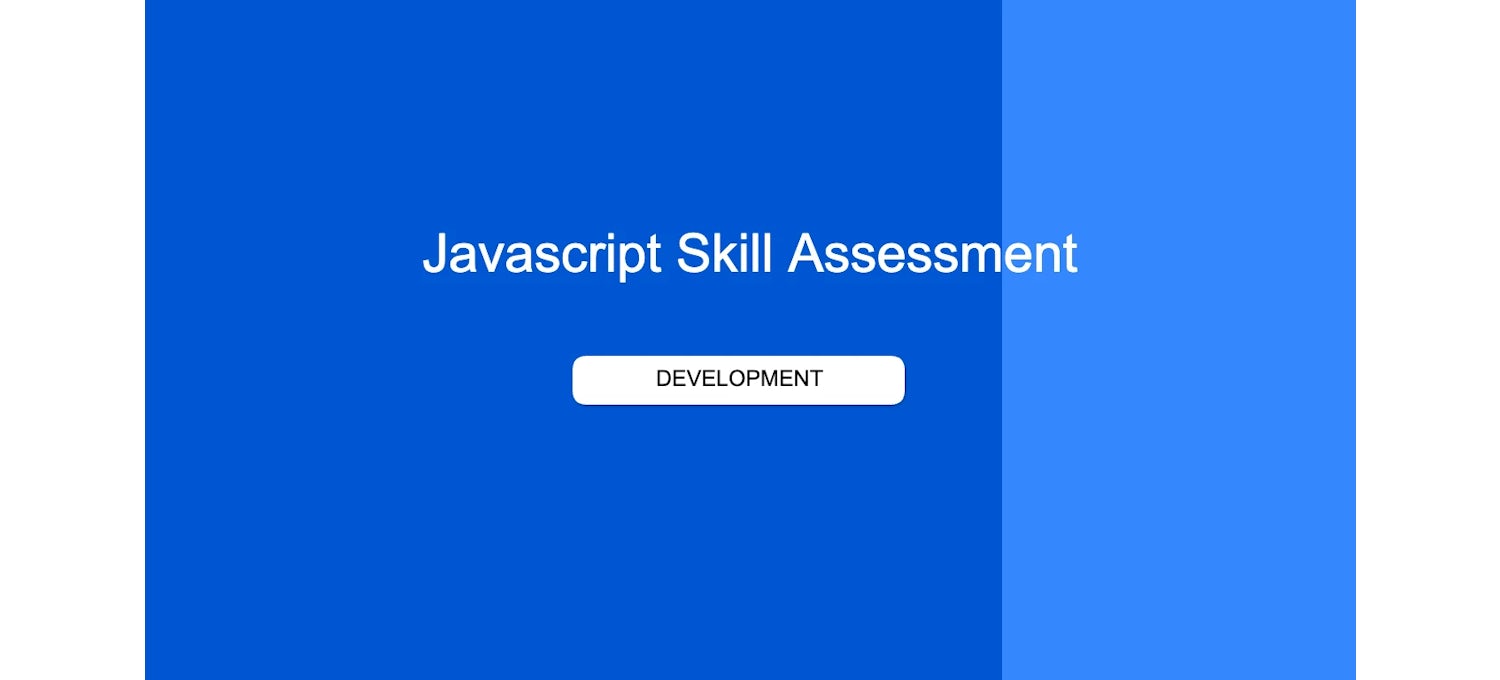JavaScript Skill Assessment
Test your JavaScript skills with this quick assessment. Answer 10 multiple-choice questions to get your score, then check the scoring guide to find your level and recommended learning path.

JavaScript Programming Quiz
JavaScript is a versatile tool that adds interactivity to web pages and creates animations, among other uses. web and mobile development, game development, virtual reality, and artificial intelligence. Alongside HTML and CSS, JavaScript is one of the core technologies of web development. It enables web pages to respond to user input, perform real-time data updates, and interact with external APIs. It plays a critical role in building everything from simple websites to complex web applications, making it essential for developers looking to create modern, interactive web experiences.
If you're interested in working in these areas, take the quiz below to better understand your JavaScript skill level and explore courses designed to take you to the next level.
Test Structure
10 multiple-choice questions
Takes approximately 5-10 minutes
Immediate results with course recommendations
Answer the following skill-based questions and click Submit to calculate your score. Use your score to find recommendations that align with your current skill level and explore courses that interest you.
����vlog�����ۿ�
1. What is the output of typeof null?
2. What's the difference between let, const, and var?
3. What is the output of this code?
const numbers = [1, 2, 3]; const [, second] = numbers; console.log(second);
4. What is a closure in JavaScript?
5. What is the output of this Promise code?
Promise.resolve(1)
.then(x => x + 1)
.then(x => { throw new Error('Failed') })
.catch(err => 1)
.then(x => x + 1)
.then(x => console.log(x))
6. What is the purpose of the async/await keywords?
7. What does the prototype property do in JavaScript?
8. What is event bubbling?
9. What is the purpose of the Map object?
10. What is the difference between == and ===?
Scoring Guide & Course Recommendations
Your quiz score above aligns with a general proficiency level of beginner, intermediate, or advanced. Match your score to the ranges below and explore course recommendations below to expand your skill set.
0-30: Beginner Level
Skill Level: New to JavaScript
Recommended ����vlog�����ۿ� Courses:
JavaScript Basics by UC Davis
Core concepts
Basic syntax
DOM manipulation
Programming Foundations with JavaScript, HTML, CSSby Duke University
Programming fundamentals
Basic interactivity
JavaScript for Beginners Specialization by UC Davis
JavaScript and jQuery basics
Project-based learning applications
40-70: Intermediate Level
Skill Level: Familiar with basics, ready for advanced concepts
Recommended ����vlog�����ۿ� Courses:
Advanced JavaScript Specialization by Scrimba
Efficient JavaScript code management
Advanced asynchronous programming
JavaScript Design Patterns by University of Alberta
Common patterns
Best practices
Application architecture
Modern JavaScript with ES6 by Packt
Modern syntax
Advanced functions
Modules and build tools
80-100: Advanced Level
Skill Level: Experienced JavaScript developer
Recommended ����vlog�����ۿ� Courses:
Advanced JavaScript Concepts by Packt
Advanced object-oriented programming
Design patterns and modular programming
Full Stack JavaScript Development Professional Certificate by IBM
Full stack applications
Node.js
Modern frameworks
JavaScript Skills Covered by Level
As you progress in your career, you'll develop more advanced skills. Below are some examples of common skills at each level.
Beginner Level
Variables and data types
Control structures
Basic functions
DOM manipulation
Event handling
Basic arrays and objects
Intermediate Level
ES6+ features
Promises and async/await
Object-oriented programming
Functional programming concepts
Error handling
Module systems
Advanced Level
Design patterns
Performance optimization
Security best practices
Testing and debugging
Build tools and bundlers
Framework architecture
JavaScript Career Paths
Your web design or development career path will be unique to your strengths and interests. Below are some common roles at different skill levels. Explore our web development career roadmap to better understand the roles available and the skills required to advance from beginner to advanced.
Beginner Level: Junior JavaScript Developer, Frontend Developer Assistant, Web Developer Intern
Intermediate Level: JavaScript Developer, Frontend Developer, React/Vue/Angular Developer
Advanced Level: Senior JavaScript Developer, Frontend Architect, Technical Lead
Grow your career with ����vlog�����ۿ�
Ready to learn more? Consider the IBM Full-Stack JavaScript Developer Professional Certificate, where you'll master the full-stack development languages, frameworks, tools, and technologies to develop job-ready skills valued by employers, including HTML, CSS, JavaScript, and React.
����vlog�����ۿ�
Writer
����vlog�����ۿ� is the global online learning platform that offers anyone, anywhere access to online course...
This content has been made available for informational purposes only. Learners are advised to conduct additional research to ensure that courses and other credentials pursued meet their personal, professional, and financial goals.